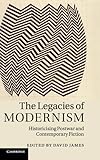The legacies of modernism : historicising postwar and contemporary fiction / edited by David James.
Contributor(s): James, David.
Material type: BookPublisher: Cambridge ; New York : Cambridge University Press, 20121Description: xii, 287 p. ; 24 cm.ISBN: 9781107012523 (hardback).Subject(s): Modernism (Literature) | Fiction -- 20th century -- History and criticism | Fiction -- 21st century -- History and criticism | Literature and history | Postcolonialism in literature | LITERARY CRITICISM / European / English, Irish, Scottish, WelshDDC classification: 809.39112 Online resources: Cover image
BookPublisher: Cambridge ; New York : Cambridge University Press, 20121Description: xii, 287 p. ; 24 cm.ISBN: 9781107012523 (hardback).Subject(s): Modernism (Literature) | Fiction -- 20th century -- History and criticism | Fiction -- 21st century -- History and criticism | Literature and history | Postcolonialism in literature | LITERARY CRITICISM / European / English, Irish, Scottish, WelshDDC classification: 809.39112 Online resources: Cover image | Item type | Current location | Call number | Status | Date due | Barcode |
|---|---|---|---|---|---|
 Books
Books
|
Eastern University Library General Stacks | 809.39112 JAL 2012 (Browse shelf) | Not For Loan | 14629 |
Includes bibliographical references and index.
Machine generated contents note: Introduction: mapping modernist continuities David James; Part I. Early Legacies: Inheriting Modernism at Mid-Century and Beyond: 1. Not what it used to be: nostalgia and the legacies of modernism Randall Stevenson; 2. H. E. Bates, regionalism and late modernism Dominic Head; 3. Moving beyond modernism in the fiction of B. S. Johnson: charting influences and comparisons Philip Tew; Part II. Modernist Aesthetics in Transition: Character, Perception, Innovation: 4. Thinking in literature: modernism and contemporary neuroscience Patricia Waugh; 5. Autonomous automata: opacity and the fugitive character in the modernist novel and after Julia Jordan; 6. Pseudo-Impressionism? Jesse Matz; 7. 'Advancing along the inherited path': Milan Kundera, Philip Roth and the idea of being traditionally new David James; Part III. Reassessing the Ethics of Modernist Fiction: 8. A complex legacy: modernity's uneasy discourse of ethics and responsibility Tim Woods; 9. 'A renewed sense of difficulty': E. M. Forster, Iris Murdoch and Zadie Smith on ethics and form Andrzej Gasiorek; 10. 'Myths of desire': D. H. Lawrence, language and ethics in A. S. Byatt's fiction Peter Preston; Part IV. Modernism's Global Afterlives: 11. Fictions of global crisis Peter Middleton; 12. Representing slums and home: Chris Abani's Graceland Susan Z. Andrade; 13. For translation: Virginia Woolf, J. M. Coetzee and transnational comparison Rebecca L. Walkowitz; Epilogue: finding the dreadfully real Adam Thorpe.
"An engagement with the continued importance of modernism is vital for building a nuanced account of the development of the novel after 1945. Bringing together internationally distinguished scholars of twentieth- and twenty-first-century literature, these essays reveal how the most innovative writers working today draw on the legacies of modernist literature. Dynamics of influence and adaptation are traced in dialogues between authors from across the twentieth century: Lawrence and A. S. Byatt, Woolf and J. M. Coetzee, Forster and Zadie Smith. The book sets out new critical and disciplinary foundations for rethinking the very terms we use to map the novel's progression and renewal, enhancing our understanding not only of what modernism was but also what it might still become. With its global reach, The Legacies of Modernism will appeal to scholars working not only in the new modernist studies, but also in postcolonial studies and comparative literature"--


There are no comments for this item.